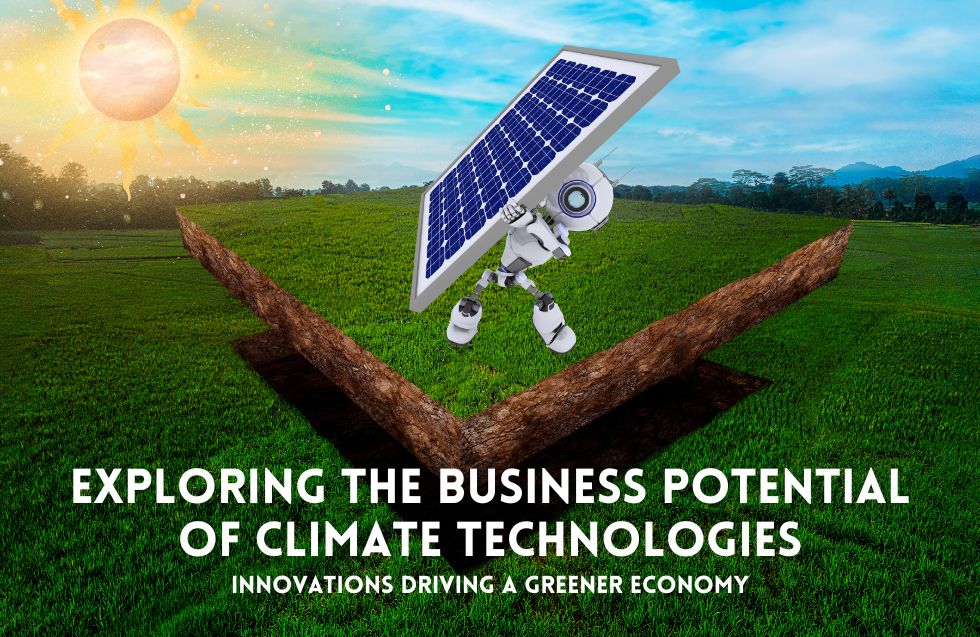As climate change becomes an increasingly urgent global concern, climate technologies (or “climate tech”) are emerging as one of the most promising areas for both environmental impact and business growth. From renewable energy sources to advanced carbon capture and sustainable agriculture, the world is witnessing a technological revolution that addresses climate issues while opening new economic avenues. Businesses investing in climate tech are finding themselves at the forefront of a burgeoning industry, one with the potential for significant profits and transformative change. In this article, we’ll explore the scope, innovation, and investment trends in climate technologies, examining how businesses can engage with these opportunities to drive both growth and sustainability.
The Rise of Climate Technology: A Market Primed for Growth
Climate technology encompasses a wide range of solutions aimed at reducing greenhouse gas emissions, improving environmental sustainability, and adapting to the effects of climate change. Key areas within climate tech include renewable energy, electric mobility, sustainable agriculture, and carbon capture. As the effects of climate change continue to impact global ecosystems and economies, climate tech is poised to become a trillion-dollar industry.
According to a report by PwC, venture capital investments in climate tech have grown at nearly five times the rate of overall global venture funding, totaling over $60 billion from 2013 to 2020. By 2025, the climate tech market is projected to surpass $1.5 trillion in value, with major contributions from sectors like energy, mobility, and food & agriculture. This unprecedented growth is attracting a wave of investors, entrepreneurs, and innovators eager to create solutions that will both mitigate climate change and generate revenue.
Renewable Energy: Powering the Future
Renewable energy is one of the most established sectors within climate tech, with solar, wind, hydro, and geothermal power offering alternatives to fossil fuels. Globally, renewables accounted for nearly 30% of all electricity generated in 2021, a figure that continues to rise as technology improves and costs decline.
Case in Point: Solar and Wind Power Investments In the past decade, the cost of solar photovoltaic (PV) technology has fallen by more than 85%, while onshore wind costs have dropped by 70%, according to the International Renewable Energy Agency (IRENA). These declining costs have made renewable energy not only more accessible but also more competitive with traditional energy sources. Large-scale projects like the Tengger Desert Solar Park in China and the Gansu Wind Farm are examples of how businesses can achieve profitable operations through renewable energy investments.
For companies, investing in renewable energy can lead to long-term savings and sustainability. In addition to reducing carbon footprints, these investments often qualify businesses for tax incentives, such as federal investment tax credits (ITCs) and renewable energy credits (RECs) in the United States. Moreover, renewables are now playing a critical role in corporate ESG (Environmental, Social, and Governance) strategies, which can enhance brand image and investor appeal.
Electric Mobility: The Future of Transportation
Transportation accounts for nearly 20% of global CO₂ emissions, making it a critical area for climate tech innovation. The transition to electric vehicles (EVs) is accelerating, driven by both consumer demand and regulatory pressure. Electric cars, buses, and even airplanes are transforming the industry, offering companies substantial business opportunities.
Case Study: Tesla’s Success and Legacy Tesla, as one of the earliest and most high-profile entrants in the EV market, has paved the way for widespread EV adoption. Its success demonstrated that consumer demand exists for sustainable mobility solutions, and it sparked a wave of investment in electric and hybrid vehicles. In 2021 alone, EV sales doubled, reaching 6.6 million units worldwide, a trend supported by government incentives, low-emission zone regulations, and advancements in battery technology.
Other companies are now innovating in electric mobility, with major automakers like General Motors and Ford setting ambitious EV targets. As battery prices fall and charging infrastructure expands, EV technology is becoming more accessible to both consumers and businesses. For startups, opportunities abound in adjacent areas such as EV infrastructure, battery recycling, and software for vehicle fleet management. Entrepreneurs can find profitable niches by developing solutions that support and expand electric mobility.
Carbon Capture and Storage (CCS): Removing Carbon from the Atmosphere
While transitioning to renewable energy and electric mobility helps reduce emissions, technologies that remove carbon dioxide directly from the atmosphere, known as carbon capture and storage (CCS), are also critical in the fight against climate change. CCS is particularly valuable for industries like cement and steel production, which are difficult to decarbonize through renewable energy alone.
Market Insight: Rising Demand for Carbon Capture Solutions The CCS market was valued at $2 billion in 2020 and is projected to grow to over $7 billion by 2030. This growth is being driven by corporate carbon reduction targets and governmental policies. Companies like Climeworks and Carbon Clean Solutions are pioneering scalable carbon capture technologies, providing services to industries that need effective ways to mitigate their emissions. Climeworks, for example, operates one of the largest direct air capture (DAC) plants, removing CO₂ from the air and storing it underground.
For investors and businesses, CCS presents a long-term opportunity in industries with regulatory mandates for carbon neutrality. These technologies, though still emerging, will become increasingly essential, providing an opportunity for companies to not only reduce emissions but also generate revenue through carbon credits or carbon offsets in the market.
Sustainable Agriculture: Feeding the Planet Responsibly
Agriculture and food production are responsible for a significant portion of greenhouse gas emissions, estimated at around 18% globally. Climate tech innovations in this sector aim to create more sustainable farming practices, reduce food waste, and improve supply chain efficiency.
Case Study: Vertical Farming and Alternative Proteins Companies like AeroFarms and Beyond Meat are pioneering solutions in sustainable agriculture. AeroFarms uses vertical farming technology to grow crops in controlled environments, reducing land and water usage. Meanwhile, Beyond Meat, along with competitors like Impossible Foods, has developed plant-based meat alternatives that reduce the environmental impact of traditional livestock farming. The global market for plant-based meat is expected to grow from $6.67 billion in 2020 to $15.6 billion by 2026, driven by consumer demand for sustainable and ethical food options.
For businesses, sustainable agriculture offers opportunities in technology development, food production, and even retail. Companies can leverage these innovations to reduce their environmental footprint, align with consumer preferences for eco-friendly products, and capitalize on an expanding market for sustainable food.
Emerging Markets for Climate Tech: Areas for Growth and Innovation
Climate tech spans multiple industries, offering unique opportunities in energy, agriculture, mobility, and beyond. However, emerging areas like climate risk analytics, water management, and circular economy solutions are also gaining traction. These fields provide untapped potential for business innovation and growth.
Water Management: Preserving a Vital Resource Water scarcity is an increasing concern, particularly in regions experiencing droughts and water pollution. Startups in climate technologies are developing smart water management systems, desalination technologies, and recycling solutions to preserve and protect water resources. For instance, Xylem, a water technology provider, develops smart meters and sensors that optimize water usage, helping cities and companies manage their water supplies efficiently.
Circular Economy: Reducing Waste through Sustainable Practices The circular economy, which emphasizes reusing and recycling materials, is another promising area. Companies like Loop Industries are creating technologies to recycle plastic waste, while others focus on product design to reduce waste and extend the lifecycle of materials. For businesses, the circular economy can lead to reduced costs, improved resource efficiency, and access to a growing market for sustainable goods.
Challenges and Considerations for Climate Tech Entrepreneurs
Despite the immense potential, climate tech also comes with challenges. High upfront costs, regulatory complexities, and technological limitations can hinder adoption. However, companies that can navigate these challenges stand to benefit from long-term growth and support from both public and private sectors.
Funding and Investment Needs climate technologies innovations often require significant R&D investment, which can be a barrier for startups. Yet, funding options are expanding as governments prioritize climate solutions and investors recognize the sector’s potential. In 2022, for example, the U.S. Inflation Reduction Act allocated $369 billion toward clean energy and climate initiatives, creating funding opportunities for climate tech companies.
Balancing Profit with Purpose climate technologies companies face the dual challenge of profitability and environmental impact. Achieving both can be difficult, but a growing number of businesses are adopting ESG frameworks that incorporate environmental goals alongside financial objectives. The companies that succeed in balancing these priorities will likely attract both customers and investors who value sustainable practices.
The Future of Climate Tech: Growth, Innovation, and Business Potential
climate technologies is not just a trend; it is a long-term shift in how industries operate and innovate. As climate concerns become more pronounced, the demand for sustainable solutions will only grow. Businesses have a unique opportunity to be part of this transformation by investing in climate tech, whether through renewable energy, sustainable agriculture, or emerging areas like water management and carbon capture.
For entrepreneurs and companies, the message is clear: climate tech is more than a moral imperative—it’s a business imperative. By embracing this growing sector, businesses can drive positive change and unlock new avenues for growth and profitability. The race toward a greener economy is on, and climate tech is leading the way.












